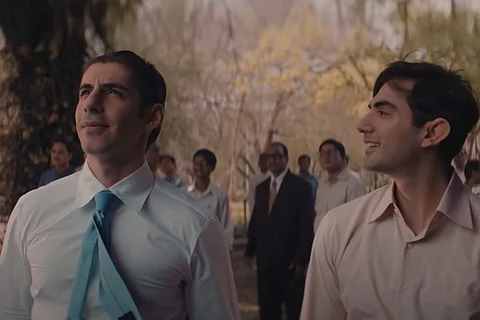

While growing up in India in the 80s and 90s, we read and heard about Dr Vikram Sarabhai, 'Father of the Indian Space Programme', and Dr Homi Bhabha, 'Father of the Indian Nuclear Programme'. Now, Rocket Boys, Sony Liv’s second superb series after Scam 1992, introduces a new generation to Homi (Jim Sarbh) and Vikram (Ishwak Singh), two young, intelligent, ambitious scientists and visionaries, who changed the way post-Independence India was perceived by the world.
When we first meet them onscreen, they are middle-aged and arguing about whether India should think about building its first atom bomb. Their argument immediately establishes their inherently different personalities but highlights their common passion for transforming the future of post-independence India. Based on a story concept by Abhay Koranne, Rocket Boys’ screenplay and direction is by Abhay Pannu with noted lyricist Kausar Munir sharing credits as a dialogue writer.
Produced by Emmay Entertainment and Roy Kapur Films, Rocket Boys’ eight episodes span over twenty years in the lives of Bhabha, Sarabhai and their contemporaries, who saw India through the most difficult and exciting years post-independence.
While most Indians know Bhabha and Sarabhai as iconic scientists and visionaries, Abhay Pannu chooses realism over reverence. He creates relatable, flawed individuals who acknowledge their privilege, suffer setbacks because of their limitations, are selfish, obsessive, and even unfaithful. Their achievement is not that they pioneered space and nuclear programmes, but that they refused to stop dreaming about a better India.
Since it’s a double biopic of sorts tracing the lives of two real-life individuals whose lives and achievements were well documented, there are necessarily multiple real-life historical figures who play an important part in the narrative. Prominent amongst them are India’s first Prime Minister Pandit Jawaharlal Nehru (played with aplomb by veteran actor Rajit Kapur), a young Dr APJ Abdul Kalam (Arjun Radhakrishnan), CV Raman (Karthik Shrinivasan), Indira Gandhi (Charu Sharma) and Sarabhai’s danseuse wife, Mrinalini Sarabhai nee Swaminathan (Regina Cassandra). All the parts are well written.
There are also multiple fictional characters who are included seamlessly in the narrative. Whether it’ is Bhabha’s close associate Mathur (KC Shankar), Parvana ‘Pipsy’ Irani (Saba Azad) who loves Homi, who in turn loves his work, or the talented but side-lined scientist Raza Mehdi (Dibyendu Bhattacharya) whose patriotism eventually triumphs over his jealousy; Abhay Pannu creates a strong supporting cast that either bolsters his leading men or exposes their flaws.
Though they have limited screen time, both Regina and Saba are excellent in their roles as Mrinalini and Pipsy. These are strong independent women who refuse to bask in the reflected glory of a spouse or wait around endlessly for the man they love to show them respect. The scenes between Bhabha and Pipsy and Vikram and Mrinalini become some of the most impactful moments in the series.
While the show temporarily loses focus from the scientific fervour to the passions of the heart, Abhay Pannu soon gets the proceedings back on track. He skillfully balances historical upheavals like the Indo-China war, with the chaos and messiness in the lives of his protagonists. There are a few scenes that make you grimace though. Yet another British official being portrayed as an obnoxious, drunk, racist fool, two men running up a tall tower to hoist the Indian flag, and very unrealistic looking CIA officials who supposedly conspired Bhabha’s untimely demise.
However, these are minor drawbacks in an otherwise brilliant series that is propelled into the orbit of excellence by its leading men. Jim and Ishwak do have some physical resemblance to Bhabha and Sarabhai but thankfully the makers do away with any prosthetics or major facial modifications. Instead, the two actors are allowed to bring two individuals to life, with Bhabha’s restless energy and childlike enthusiasm playing off Sarabhai’s quieter and more composed demeanour.
Cinematographer Harshvir Oberai, editor Maahir Zaveri, production designer Meghna Gandhi, and costume designers Biju Antony and Uma Biju all deserve applause for recreating an eventful era in India’s history that has hardly ever been dealt with such a deft hand. A show like this also relies heavily on special effects and VFX creative head Sandhya Savanur makes sure that the authenticity is never compromised.
Rocket Boys could have easily become yet another series full of chest-thumping nationalism spouted by unrealistic heroes. Instead, what we have is a wonderfully nuanced series about two mad scientists who attempted the absurd and achieved the seemingly impossible. This show is a must-watch. Go binge right away.
Disclaimer: This review was not paid for or commissioned by anyone associated with the series/film. TNM Editorial is independent of any business relationship the organisation may have with producers or any other members of its cast or crew.